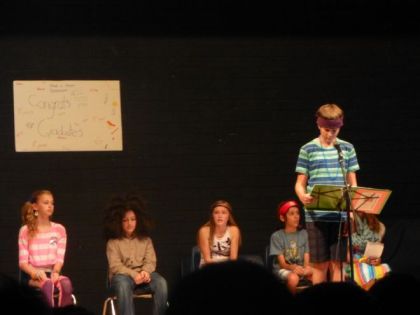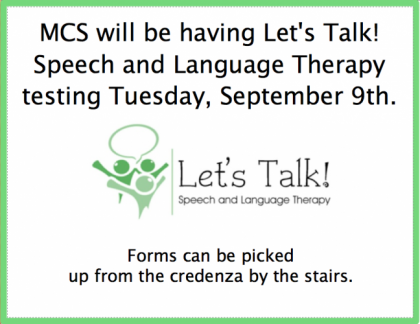Learning the Language of Life
Montessori Children Handle Big Words and Big Ideas

As a parent I was surprised about the words my children knew and used correctly (no, not the bad ones.) We’ve experienced them going from crying to making sounds, from sounds to their first words (mama, dada), from words to phrases (me go) to sentences – “I want candy.” It seems like a long (and sometimes frustrating) process for both children and adults to begin to communicate. We can’t wait for them to start talking and then ironically, we spend a lot of time telling them to be quiet.
The beginning formation of their language skills is “ice bergian.” Ninety percent of what they know supports the ten percent that is audible. The structure of their language has been constructed by and large with little direct input. They have been sorting out the complexity of words and phrases. They don’t yet possess all the building tools to communicate to the world they inhabit. That is why at an early age two phrases dominate their conversation – “Why?” and “What’s that?” They are continually constructing and they need solid linguistic materials to build with.
Baby talk is sweet but does not contribute to linguistic development or communications. At an early age, at least by three if not sooner, children are ready (and capable) of big words and big ideas. A Montessori education builds on this sensitive period for language and learning by introducing advanced concepts. Parents are often amazed that their child can say “equilateral triangle” let alone know what it means. But is equilateral triangle any more complex linguistically than Elizabeth Washington?
A Montessori classroom is constantly introducing new concepts and constructs and a major part of this introduction is linguistic. It does little good to point out squares or circles unless you can call them by name, define them and find them again. Montessori education is noted for its “Three Period Lesson.” First, you present the article. “This is red.” “This is blue.” Second, you ask, “Can you touch the red?” “Can you touch the blue?” (You see if they have understood the vocabulary.) Third, you ask, “What is this?” They answer “red.” “What is this?” They answer “blue.” (You see if they have mastered the vocabulary and the concept.)
Language starts with the concrete – mama, doggie, cat and proceeds to action – “me go, I jump.” And then it begins to add the color of adjectives – tall, short, biggest, smallest (all demonstrated in the classroom) until language blooms into conversation, discussion (and debate.)
When our son started Montessori at 17 months we wanted to be good Montessori parents by offering him choices he could make. Everyday for breakfast we held up two boxes of cereal and asked, “Do you want this or that?” Cereal, thereafter, became known as “dis and dat.” (In hindsight, we should have been correct and named the cereals for him – but it would have ruined a good story!)
It is important that we correctly name the words and actions of their lives. A Montessori classroom is constantly adding vocabulary to a child’s linguistic development. Studies have indicated that extensive vocabularies are a hallmark of successful adults. This process and habit of vocabulary acquisition is a foundational concept of your child’s Montessori experience.
While we do use body language and facial gestures, oral language is the predominant means of communication. Helping your child communicate clearly their needs, desires, frustrations, etc helps them to move on to the more complex use of language and culture – the ability to define (and embrace) intangible concepts like love, hope and faith. Ironically, (and I don’t know how it comes about) the first intangible concept they latch on to is wrapped up in the words, “It’s not fair.” But it is from there that justice, respect, duty, honor, honesty, loyalty begin to form with the child and are defined.
One of Montessori education’s great gifts to your child is the emphasis and focus on observation. Your child is given training and time to become an observer. As has been said, “You can see a lot if you just look.” The materials and exercises of the classroom are designed to aid your child during these earliest formative years to develop the habit of not only observing but of naming and defining the experience.
It is never just the accumulation of knowledge (or vocabulary) but the ability to use that knowledge to think, to communicate and to formulate the actions that are necessary for success. The more you talk with your child the more you develop the communication skills your child needs to succeed in the world.
Edward Fidellow
